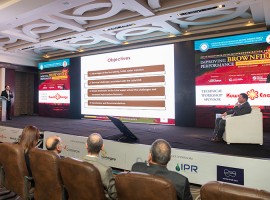By Shaden Esam Al-Dine
Human capital is a vital component in determining socio-economic development in any country. Enhancing human capacities within any business is, therefore, crucial. This is particularly true of the energy sectors in the Middle East where oil and gas are the key to sustaining economic growth and bettering the general standard of living.
Shortages in human capital and a lack of adequately trained energy industry personnel is, no doubt, a global problem. Yet, in the Middle East, the challenge is more visible as fewer students decide to pursue science and technology related studies and an aging workforce cannot be easily replaced to meet the needs of the industry. The public and private sectors in hydrocarbon business are thus experiencing a talent crunch, as Honeywell and Deloitte pointed out in their reports based on recent surveys in the region.
Skills Shortage in Oil&Gas Industry
The skills shortage is of a particular concern in the energy industry, given the length of time it takes to train specialists, for instance, in areas such as geology and petrophysics, industry experts declared. A call for fresh experienced human resources is growingly urgent now than ever before also in relation to the global commitment to mitigate climate change effects, conduct safe exploration for oil and gas, and exploit hydrocarbon reserves in an environmentally protective way, for which highly qualified experts are invaluable.
In the present low oil prices environment that makes many companies shrink their expenditure, often by cutting headcount, fewer oil and gas firms are capable of providing sufficient training to their employees. Elaine Welch, a consultant at grow.ME wrote that many of small to mid-sized companies do not have the bandwidth, nor the financial ability to support activities such as graduate programs, apprentice schemes, or comprehensive quality in-house training.
In Egypt, for instance, professionals at Agiba Petroleum Company desire global training programs abroad in order to test new technologies and its production. Yet, the company is able to assign not more than “two courses per annum for each employee,” said Eng. Shehab Ali Abouel Kasem, the company’s Senior Petroleum Engineer in an interview with Egypt Oil&Gas, which is not sufficient.
In light of the lacking funds for targeted technical modules, the private sector has thus opted for providing soft-skills training, which is less demanding in capital and time. Dr. Ahmed Abdel Bassit, Human Development Consultant at the National Management Institute told Egypt Oil&Gas that training institutions offer courses in presentation, interpersonal and effective communication skills.
In some cases this lack of focused technical training might lead employees to jump to another company that may be able to sustain their more relevant schemes for their staff. A 2013 study sponsored by BP and conducted by the Society of Petroleum Engineers, found that 75% of survey respondents stated that training factored heavily in their choice of employment, 53% noted they would consider changing a company for the lack of professional development opportunities, and as many as 25% believed that insufficient training would hurt their careers in the long run.
Egypt Faces Skills Gap
Egypt is one of the countries that have witnessed skills gap among competent technical workforce, who, as they move up the career ladder in an organization, lack other relevant skills such as management skills and requisite financial acumen required to drive the company towards achieving its strategic and financial objectives.
While traditionally perceived as highly qualified, “the Egyptian calibers have always been in high demand in the Middle East,” said Dr. Hossam Farahat, the President of EGY TEC Projects and Professor at the American University in Cairo (AUC) in an interview with Egypt Oil&Gas. As he further noted, “this demand is not as it used to be, because large organizations are shrinking.”
As most of the companies tend to rely on designing their individual schemes for staff development in Egypt, Dr. Farahat pointed out that the general objective in the industry is for “each and every company to develop a new generation of people that are not only technically superior in their expertise, but also well trained in managerial and communication skills to be able to drive companies’ performance.”
Given the economic conditions, this is not always possible. Hence, Egypt itself is currently seeing a lack of talents. “A shortage in the logistics departments in oil and gas sector” is most visible, as Dr. Farahat specified. Therefore, as he further explained, there is a challenge “to invest more in the development of lower level management employees, which would in turn benefit the companies,” in his opinion.
Fueling the Future through Qualification Training
In attempt to generate qualified work labor for the oil and gas industry, companies and training organizations have been searching for creative ways to approach this conundrum. Darren Grainger, Middle East Regional Director at NES Global Talent, a recruitment specialist agency, said that there is an ongoing “war for talents.”
Several countries and companies have undertaken measures to meet this call. But as ‘the talent war’ intensifies, “increasingly innovative solutions are required to fill in demanded disciplines,” according to Grainger.
The industry must therefore look ahead to ensure its staff meets requirements that global demand for energy poses on individual firms now and for the future, rightly emphasized Sean Price, Head of Direct Delivery at Pearson Education, the world’s largest learning company.
In line with that, Pearson Education has developed and implemented a program named TQ, which provides vocational & work-based training scheme. In the Gulf region, TQ program assists governments with the implementation of national employment strategies by offering nationals the opportunity to gain an internationally recognized qualification that will help them get employment in an oil and gas company.
In Saudi Arabia, “the TQ program is considered as oil and gas training experience, which works with a number of education and training providers, who are responsible for operating the Saudi Petroleum Services Polytechnic (SPSP),” said Price. The SPSP was founded by the Saudi Ministry of Petroleum and Mineral Resources, the Technical and Vocational Training Corporation (TVTC), and Saudi Arabian Chevron. The institute equips Saudi school leavers with a two-year vocational qualification that was developed in close consultation with major employers in the kingdom in response to corporate needs for human resources.
In addition, the TQ program also delivers academic and construction skills training at Jizan Construction Centre in the south-west of Saudi Arabia. It has provided an extensive portfolio of training for the world’s largest oil and gas company, Saudi Aramco. Pearson’s TQ aims at building a strong and capable workforce for the future of a country, where oil and gas exploitation is the cornerstone of economic prosperity, as Price put it in an interview with Trade Arabia.
Another company that has developed a comprehensive training program is GE Oil & Gas, a global leader in advanced technologies and services. In various locations worldwide, GE Oil & Gas has implemented so called Edison Engineering Development Program (EEDP), a two-year initiative for recent engineering graduates. EEDP is an intensive program designed to accelerate participants’ professional development through a variety of intensive technical and business-related training.
The program consists of three or more rotational assignments such as engineering projects driven by GE’s actual business priorities. “Edison graduates have the technical and business foundation to proactively and continually make innovative contributions to GE’s future,” according to the company website. The innovative approach of the program helps cultivate technical problem-solving skills via advanced engineering coursework, formal reports and presentations to senior leadership. Moreover, participants have the opportunity to earn credits towards M.Sc. degrees in engineering or technologies application programs.
Bridging the Gap
In order to overcome the present challenge of skills shortage, there is an immediate need to target cooperation with all involved parties – governments, international oil companies (IOCs), and private educational entities.
Dr. Hossam Farahat affirmed in an interview with Egypt Oil&Gas that the solution to overcome talent shortages in Egypt is to generate high quality university graduates through university-sector collaboration as a first step. “There should be an initiative sponsored by the oil and gas companies to bridge the gap between the faculty students and the upcoming engineers.”
While this is currently being implemented in Egypt, it is still on a small scale, mainly through individual faculties, a Rotary Club and large consultancy entities, which promote ‘From University to Work’ schemes, as Dr. Farahat further explained. These are designed for final year university students to enhance their experience in the field and boost their professional capacities to apply for job openings. EGY TEC Projects President also revealed that “unfortunately, we pursue the initiative ‘From University to Work’ for a maximum of 500 people per annum, because this is a voluntary work.”
In light of that, he advocated strongly that the private sector should take a more active part in these training schemes. As he put it: “If a petroleum company with its available resources sponsors similar projects, it can have both short- and long-term positive effect.”
The important part for the companies to consider is to broadly share relevant information about the available opportunities at all levels in the oil & gas industry. A pro-active targeted communication to the employees can make a difference whether those with expertise stay or leave to a new employer. Professionals need to know about learning and development options, promotion, and advancement schemes, as well as about compensation and benefits packages in order to garner their interest to stay working in a company.
IOCs and private businesses companies have a tangible vested interest in as well as an obligation to participate in this human capital development endeavor. Collectively, the involvement in spurring youth development can ultimately conquer the skills shortage and help foster economic diversification and innovation that are needed to guarantee sustainable growth for the entire region.








